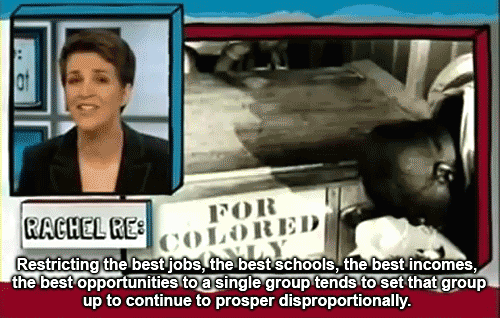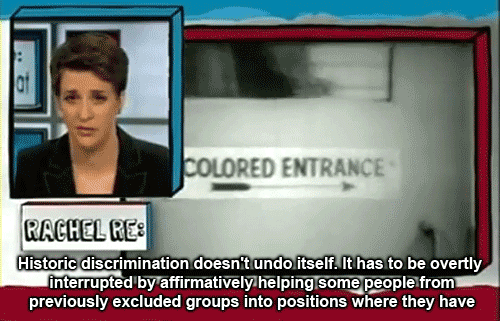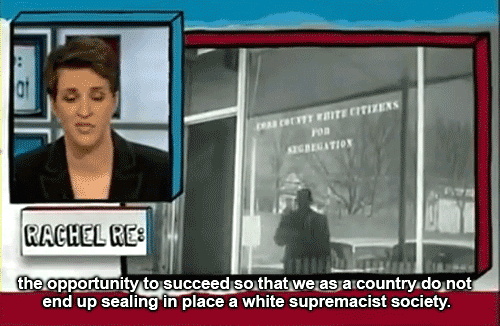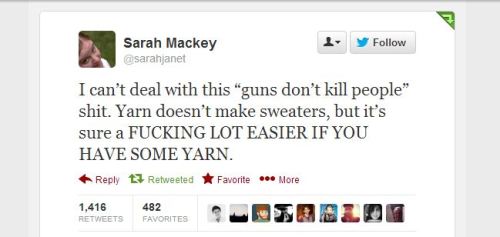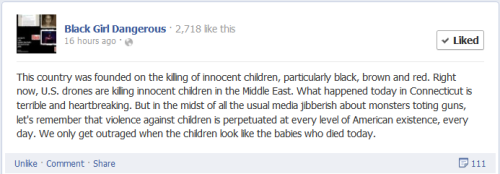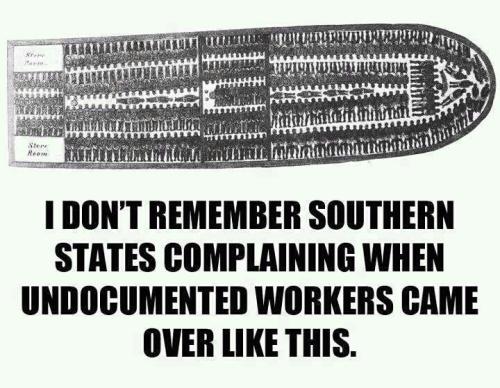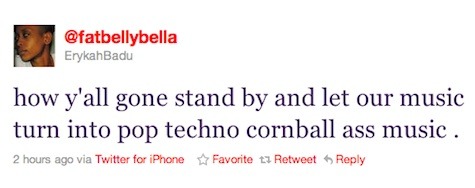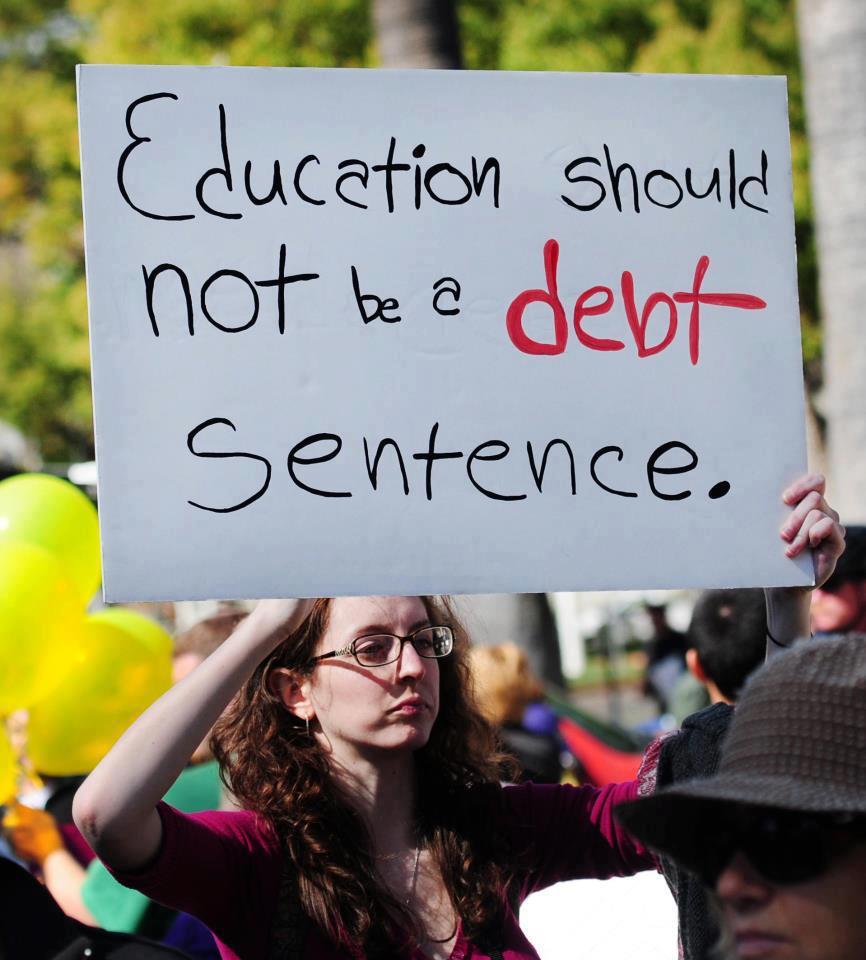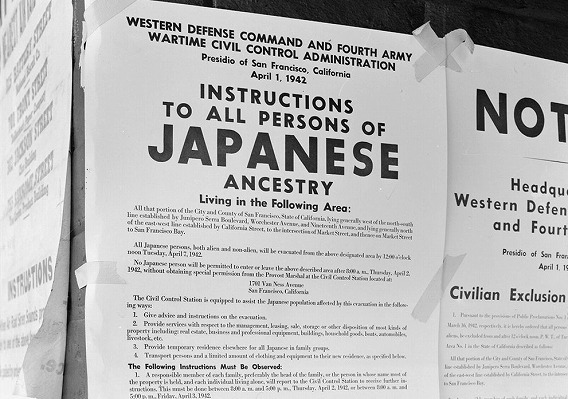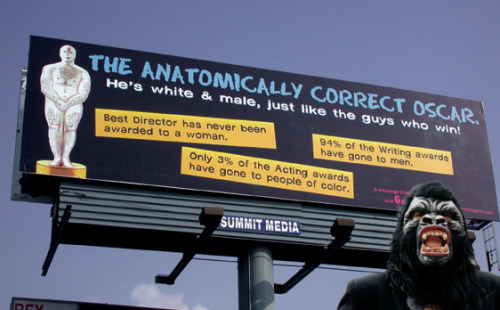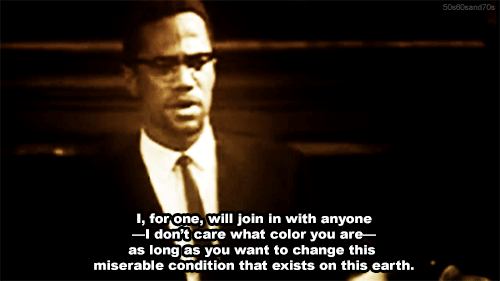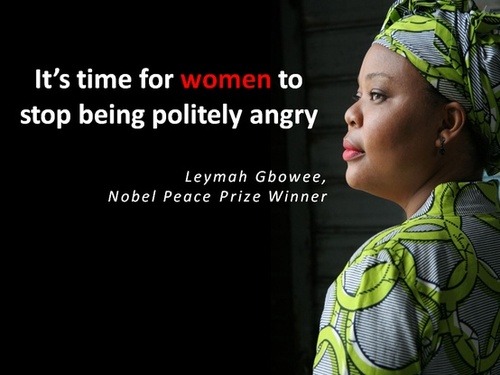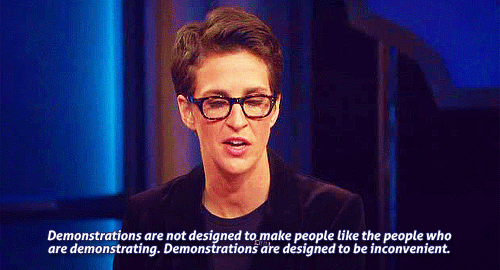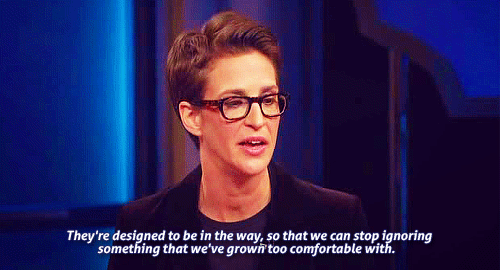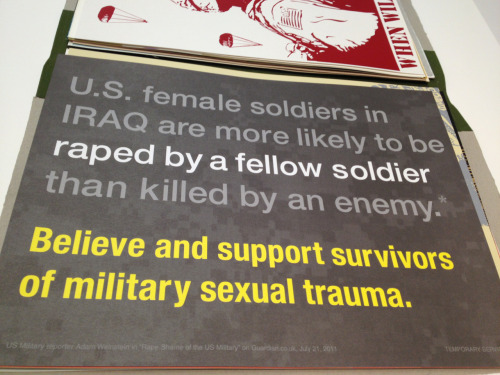Reblogged from WYSIWYG
Inside the mind of a kind of quirky, pretty stubborn, way too opinionated, twenty-something, heteroflexible Black female newly employed up-and-moved-to-DC Princeton GRADUATE who's just trying to sort out her life. An uninhibited celebration of all that is me, this blog is an exercise in self-discovery and live-with-your-heart-wide-open-ness. Though I make respect a habit, I will not always be politically correct, and I believe in the power of making audiences uncomfortable to inspire change.
Monday, December 31, 2012
"White American children in this country who become victims of gun violence are a sign of shattered innocence, an anomaly that must be analyzed and dissected to ensure that it doesn’t happen again. Black and Brown American children who become victims serve as an indictment of our communities, our homes and our parenting."
--Kirsten West Savali
(via RiotsnotDiets)
Sunday, December 30, 2012
"With you, intimacy colours my voice. Even 'hello' sounds like 'come here.'"
--Warsan Shire
(via HappinessRuns...)
"Somebody told a real life woman that her skin was too brown to play an imaginary creature. That basically in the whole fictional world of Lord of the Rings and The Hobbit, where you have dragons and trolls and talking trees, where you draw the line, where imagination is capped out, no more room, is for a brown hobbit.
"Like, fiery eyeball thing, no problem, but don't even try to imagine a Samoan elf. That shit will blow your mind."
--Wyatt Cenac
(via Lavender Labia)
So much greatness in one place
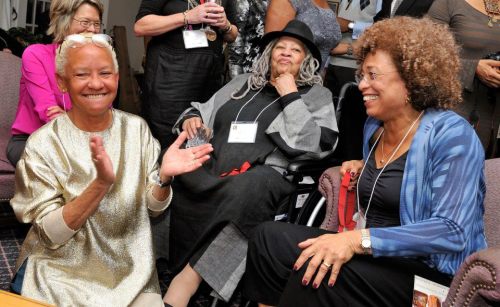 | |
| Nikki Giovanni, Toni Morrison, and Angela Davis talking and laughing about something. Reblogged from Racialicious |
"You are not responsible for the programming you picked up in childhood. However, as an adult, you are one hundred percent responsible for fixing it."
--Ken Keyes, Jr.
(via Tudo Bom(b))
"Twenty-two children injured [by a knife attack in China]. Versus, at current count, 18 little children and nine other people shot dead. That’s the difference between a knife and a gun. Guns don’t attack children; psychopaths and sadists do. But guns uniquely allow a psychopath to wreak death and devastation on such a large scale so quickly and easily. America is the only country in which this happens again — and again and again. You can look it up."
(via Tudo Bom(b))
"Imagine you are Emma Faye Stewart, a thirty-year-old, single African-American mother of two who was arrested as part of a drug sweep in Hearne, Texas. All but one of those people arrested were African-American. You are innocent. After a week in jail, you have no one to care for your two small children and are eager to get home. Your court-appointed attorney urges you to plead guilty to a drug distribution charge, saying the prosecutor has offered probation. You refuse, steadfastly proclaiming your innocence. Finally, after almost a month in jail, you decide to plead guilty so you can return home to your children. Unwilling to risk a trial and years of imprisonment, you are sentenced to ten years probation and ordered to pay $1,000 in fines, as well as court and probation costs. You are also now branded a drug felon. You are no longer eligible for food stamps; you may be discriminated against in employment; you cannot vote for at least twelve years; and you are about to be evicted from public housing. Once homeless, your children will be taken away from you and put in foster care.
"A judge eventually dismisses all cases against the defendants who did not plead guilty. At trial, the judge finds that the entire sweep was based on the testimony of a single informant who lied to the prosecution. You, however, are still a drug felon, homeless, and desperate to regain custody of your children.
"Now place yourself in the shoes of Clifford Runoalds, another African-American victim of the Hearne drug bust. You returned home to Bryan, Texas, to attend the funeral of your eighteen-month-old daughter. Before the funeral services begin, the police show up and handcuff you. You beg the officers to let you take one last look at your daughter before she is buried. The police refuse. You are told by prosecutors that you are needed to testify against one of the defendants in a recent drug bust. You deny witnessing any drug transaction; you don't know what they are talking about. Because of your refusal to cooperate, you are indicted on felony charges. After a month of being held in jail, the charges against you are dropped. You are technically free, but as a result of your arrest and period of incarceration, you lose your job, your apartment, your furniture, and your car. Not to mention the chance to say good-bye to your baby girl.
"This is the War on Drugs."
--Michelle Alexander, The New Jim Crow: Mass Incarceration in the Age of Colorblindness, pg. 97-98
"We all have a blind spot around our privileges shaped exactly like us.
And I’m telling you guys, we’re never fucking going to get anywhere as long as our economies of attraction continue to resemble more or less the economies of attraction of white supremacy. Finding people who practice decolonial love is as hard inside of a vast movement as it is outside. The actual standard of decolonial love, how little discussed, how little understood, and yet in many ways is the great test of who we are and of our praxis and of our communal praxis."
--Junot Díaz, Keynote Speech at Facing Race 2012
(via Tudo Bom(b))
I have as many speeches from this conference as are available on YouTube queued on my Watch Later list. Expect way more quotes at some future point.
"The important thing is that we cease treating sex as something shameful, and an aspect of life separate from all the rest. We need to make decisions about sex and evaluate them in the same framework which we use to judge worth of our other capacities, be they our intelligence, intuitions, physical stamina or prowess, or other special talents."
--Lester A. Kirkendall, Premarital Intercourse and Interpersonal Relationships (1961)
(via WYSIWYG)
"...harsh mandatory minimum sentences for drug offenders have been consistently upheld by the U.S. Supreme Court. In 1982, the Supreme Court upheld forty years of imprisonment for possession and an attempt to sell 9 ounces of marijuana. Several years later, in Harmelin v. Michigan, the Court upheld a sentence of life imprisonment for a defendant with no prior convictions who attempted to sell 672 grams (approximately 23 ounces) of crack cocaine. The Court found the sentences imposed in those cases 'reasonably proportionate' to the offenses committed--and not 'cruel and unusual' in violation of the Eighth Amendment. This ruling was remarkable given that, prior to the Drug Reform Act of 1986, the longest sentence Congress had ever imposed for possession of any drug in any amount was one year. A life sentence for a first-time drug offense is unheard of in the rest of the developed world. Even for high-end drug crimes, most countries impose sentences that are measured in months, rather than years. For example, a conviction for selling a kilogram of heroin yields a mandatory ten-year sentence in U.S. federal court, compared with six months in prison in England. Remarkably, in the United States, a life sentence is deemed perfectly appropriate for a first-time drug offender."
--Michelle Alexander, The New Jim Crow: Mass Incarceration in the Age of Colorblindness, pg. 90
Saturday, December 29, 2012
"I will have an undergraduate class, let’s say a young white male student, politically-correct, who will say: “I am only a bourgeois white male, I can’t speak.” … I say to them: “Why not develop a certain degree of rage against the history that has written such an abject script for you that you are silenced?” Then you begin to investigate what it is that silences you, rather than take this very determinist position-since my skin colour is this, since my sex is this, I cannot speak… From this position, then, I say you will of course not speak in the same way about the Third World material, but if you make it your task not only to learn what is going on there through language, through specific programmes of study, but also at the same time through a historical critique of your position as the investigating person, then you will have earned the right to criticize, you be heard. When you take the position of not doing your homework- “I will not criticize because of my accident of birth, the historical accident” - that is the much more pernicious position."
--Gayatri Spivak
(via WYSIWYG)
"The 'drug-courier profiles' utilized by the DEA and other law enforcement agencies for drug sweeps on highways, as well as in airports and train stations, are notoriously unreliable. In theory, a drug-courier profile reflects the collective wisdom and judgment of a law enforcement agency's officials. Instead of allowing each officer to rely on his or her own limited experience and biases in detecting suspicious behavior, a drug-courier profile affords every officer the advantage of the agency's collective experience and expertise. However, as legal scholar David Cole has observed, 'in practice, the drug-courier profile is a scattershot hodgepodge of traits and characteristics so expansive that it potentially justifies stopping anybody and everybody.' The profile can include traveling with luggage, traveling without luggage, driving an expensive car, driving a car that needs repairs, driving with out-of-state license plates, driving a rental car, driving with 'mismatched occupants,' acting too calm, acting too nervous, dressing casually, wearing expensive clothing or jewelry, being one of the first to deplane, being one of the last to deplane, deplaning in the middle, paying for a ticket in cash, using large-denomination currency, using small-denomination currency, traveling alone, traveling with a companion, and so on. Even striving to obey the law fits the profile! The Florida Highway Patrol Drug Courier Profile cautioned troopers to be suspicious of 'scrupulous obedience to traffic laws.' As Cole points out, 'such profiles do not so much focus an investigation as provide law enforcement officials a ready-made excuse for stopping whomever they please.'"
--Michelle Alexander, The New Jim Crow: Mass Incarceration in the Age of Colorblindness, 71-72
Photo
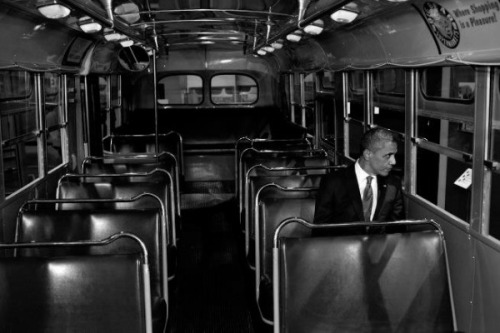 |
| Reblogged from Lavender Labia |
That's within my father's lifetime. I hope he sees this photo and remembers taking me to sit in that seat when he lived in Detroit. That was 2005, and I was overwhelmed by our progress. Now it's 2012 and I'm so torn between wanting to cry in celebration of how far we've come and wanting to cry in desperation at how far we have left to go.
I don't understand why Bill Clinton is a political figure I'm supposed to like as a Black person.
I'm not even going to touch on the RAGE that overtakes me whenever anyone refers to him as the first Black president (or when someone refers to Obama as the first LGBT president). I'm just going to put a few paragraphs from Michelle Alexander's The New Jim Crow: Mass Incarceration in the Age of Colorblindness (pg. 57-58) here for you to ponder.
"...in 1992, presidential candidate Bill Clinton vowed that he would never permit any Republican to be perceived as tougher on crime than he. True to his word, just weeks before the critical New Hampshire primary, Clinton chose to fly home to Arkansas to oversee the execution of Ricky Ray Rector, a mentally impaired Black man who had so little conception of what was about to happen to him that he asked for the dessert from his last meal to be saved for him until the morning. After the execution, Clinton remarked, 'I can be nicked a lot, but no one can say I'm soft on crime.
"Once elected, Clinton endorsed the idea of a federal 'three strikes and you're out' law, which he advocated in his 1994 State of the Union address to enthusiastic applause on both sides of the aisle. The $30 billion crime bill sent to President Clinton in August 1994 was hailed as a victory for the Democrats, who 'were able to wrest the crime issue from the Republicans and make it their own.' The bill created dozens of new federal capital crimes, mandated life sentences for some three-time offenders, and authorized for than $16 billion for state prison grants and expansion of state and local police forces. Far from resisting the emergence of the new caste system, Clinton escalated the drug war beyond what conservatives had imagined possible a decade earlier. As the Justice Policy Institute has observed, 'the Clinton Administration's 'tough on crime' policies resulted in the largest increases in federal and state prison inmates of any president in American history.
"Clinton eventually moved beyond crime and capitulated to the conservative racial agenda on welfare. This move, like his 'get touch' rhetoric and policies, were part of a grand strategy articulated by the 'new Democrats' to appeal to the elusive White swing voters. In so doing, Clinton--more than any other president--created the current racial undercaste. He signed the Personal Responsibility and Work Opportunity Reconciliation Act, which 'ended welfare as we know it,' replacing Aid to Families with Dependent Children (AFDC) with a block grant to states called Temporary Assistance for Needy Families (TANF). TANF imposed a five-year lifetime limit on welfare assistance, as well as a permanent, lifetime ban on eligibility for welfare and food stamps for anyone convicted of a felony drug offense--including simple possession of marijuana.
"Despite claims that these radical policy changes were driven by fiscal conservatism--i.e., the desire to end big government and slash budget deficits--the reality is that government was not reducing the amount of money devoted to the management of the urban poor. It was radically altering what the funds would be used for. The dramatic shift toward punitiveness resulted in a massive reallocation of public resources. By 1996, the penal budget doubled the amount that had been allocated to AFDC or food stamps. Similarly, funding that had once been used for public housing was being redirected to prison construction. During Clinton's tenure, Washington slashed funding for public housing by $17 billion (a reduction of 61 percent) and boosted corrections by $19 billion (an increase of 171 percent), 'effectively making the construction of prisons the nation's main housing program for the poor.'
"Clinton did not stop there. Determined to prove how 'tough' he could be on 'them,' Clinton also made it easier for federally assisted public housing projects to exclude anyone with a criminal history--an extraordinarily harsh step in the midst of a drug war aimed at racial and ethnic minorities. In his announcement of the 'One Strike and You're Out' Initiative, Clinton explained: 'From now on, the rules for residents who commit crime and peddle drugs should be one strike and you're out.' The new rule promised to be 'the toughest admission and eviction policy that HUD has implemented.' Thus, for countless poor people, particularly racial minorities targeted by the drug war, public housing was no longer available, leaving many of them homeless--locked out not only of mainstream society, but their own homes."
"Some problems we share as women, some we do not. You [white women] fear your children will grow up to join the patriarchy and testify against you; we fear our children will be dragged from a car and shot down in the street, and you will turn your backs on the reasons they are dying."
--Audre Lorde, “Age, Race, Class, and Sex: Women Redefining Difference”
(via WYSIWYG)
(via WYSIWYG)
Friday, December 28, 2012
Always relevant.
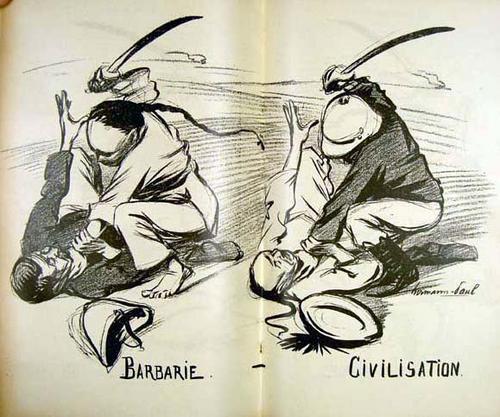 |
| Hermann-Paul, « Barbarie. Civilisation », Le Cri de Paris, n° 1900, 7/10/1899, via WYSIWYG |
"To be in good moral condition requires at least as much training as to be in good physical condition."
--Jawaharlal Nehru
(via WYSIWYG)
Thursday, December 27, 2012
THIS.
"The thing that sucks about Girls and Seinfeld and Sex and the City and every other TV show like them isn’t that they don’t include strong characters focusing on the problems facing blacks and Latinos in America today. The thing that sucks about those shows is that millions of black people look at them and can relate on so many levels to Hannah Horvath and Charlotte York and George Costanza, and yet those characters never look like us. The guys begging for money look like us. The mad black chicks telling white ladies to stay away from their families look like us. Always a gangster, never a rich kid whose parents are both college professors. After a while, the disparity between our affinity for these shows and their lack of affinity towards us puts reality into stark relief: When we look at Lena Dunham and Jerry Seinfeld, we see people with whom we have a lot in common. When they look at us, they see strangers."
--Cord Jefferson, Hipster Racism Runoff And The Search for The Black Costanza
(via Racialicious)
...This might actually sum up most of my problem with pop culture. Wow.
I fundamentally don't understand people who don't enjoy reading.
"That is part of the beauty of all literature. You discover that your longings are universal longings, that you’re not lonely and isolated from anyone. You belong."
--F. Scott Fitzgerald
The best moment of my Christmas vacation
was not opening my presents.
It was not seeing my family eat the cookies and pie that I so lovingly made.
It was not baking said cookies with TN, or surprising TJ and DH with them.
It wasn't watching The Preacher's Wife with my mom.
It wasn't my little brother actually helping us decorate the tree.
It wasn't snuggling with FO on his couch.
It wasn't breakfast with SH.
It wasn't dinner, though that was delicious.
For a while, I thought it was going to be the moment my mother's look of confusion blossomed into a look of joyful recognition as she recognized what Garmin is a brand of.
But something tiny beat all of that. After dinner and present-opening at my grandmother's house, my little 9 year old cousin was sitting in the living room as we were talking about my little sister's first semester of college.
It was not seeing my family eat the cookies and pie that I so lovingly made.
It was not baking said cookies with TN, or surprising TJ and DH with them.
It wasn't watching The Preacher's Wife with my mom.
It wasn't my little brother actually helping us decorate the tree.
It wasn't snuggling with FO on his couch.
It wasn't breakfast with SH.
It wasn't dinner, though that was delicious.
For a while, I thought it was going to be the moment my mother's look of confusion blossomed into a look of joyful recognition as she recognized what Garmin is a brand of.
But something tiny beat all of that. After dinner and present-opening at my grandmother's house, my little 9 year old cousin was sitting in the living room as we were talking about my little sister's first semester of college.
Cousin: I already know what college I want to go to.
Me: Oh really? What college do you want to go to?
Cousin: Princeton! ...Or Old Miss because it was in The Blind Side.(later)
Me: Why hasn't anyone tried my pie yet? No one appreciates me.
Cousin: I appreciate you, Maya. You inspire me to do lots of things.
"People of color have to learn White culture for survival. White people learn Brown and Black culture for 'ghetto' jokes."
--Sara David
(via Free Bird)
It may surprise much of my readership, but I actually pretty vehemently disagree with this quote as a blanket statement.
First, I would like to henceforth officially dismiss the term "[race/ethnicity] culture" from any and all popular discourse. Every group of people, no matter how specific you get to narrow them down, has cultures, plural. Urban Northern Black culture is very different from rural Southern Black culture, which is very different from Afro-Caribbean culture, which is very different from the cultures of recent African immigrants. The same goes for the cultures of various places in Latin America--Mexican culture is not Cuban culture is not Dominican culture is not Brazilian culture, etc. Even White culture is not a monolith--think about Midwestern US culture v. Californian surfer culture v. preppy New England culture. This is just an improper standpoint from which to discuss anything.
Secondly, I feel like this quote assumes that people of color grow up in environments mainly or entirely composed of other people of color, and have to venture out into the White world and fight and learn on their feet to make it because everything is so different. Bitch, please. My first best friend was White (as were the overwhelming majority of my closest friends until college), the first boy I couples skated with at our local skating rink was White, my first kiss was with a White boy, all of my teachers were White until high school. I could go on. Things typically described as "Black culture" involved much more active trying to learn on my part, as they were not part of my everyday lived experiences. What are you calling White culture here, anyway? Are you equating it with mainstream culture? Like, pop music and sitcoms? Because NSYNC was the first concert I had tickets to and Boy Meets World and Sabrina the Teenage Witch were as much a part of my childhood as The Cosby Show and Sister, Sister. You're arrogant as fuck if you assume that all Black and Brown people grew up outside of the mainstream.
Thirdly, and this is related to my first point, I don't think that every time a White person, or a person of any race, for that matter, adopts things that are generally associated with persons of another race, they do so with malice in their hearts. Also, I don't agree with the idea that people of a certain race somehow have a more authentic claim to certain elements generally assumed under "[that race]'s culture"--for example, during a conversation with WYSIWYG a few weeks ago, I shocked her by saying
"I don't really see why teen white boy asshat who thinks he's legit because he listens to rap is really that much different than teen black boy asshat who thinks he's legit because he listens to rap. Sure, we started it, but why does that give us some universal claim of authentically owning [rap music] or something? It's a culture you can play into or not play into."And that's a viewpoint I stand by. If you try to tell me there are no Black and Brown people in the world making ghetto jokes, you're a damned liar. I don't see why the offensiveness of a 'ghetto' joke should vary depending upon the color of the skin of the person who makes the joke, just like I don't see why we assume that Black and Brown people are somehow more significantly linked to "the ghetto" than are White people. You're either of that kind of a background/situation or you're not. End of story.
Sincerely,
A Black Girl who Grew Up in Suburbia
Monday, December 24, 2012
"I don't know if I continue, even today, always liking myself. But what I learned to do many years ago was to forgive myself. It is very important for every human being to forgive herself or himself because if you live, you will make mistakes--it is inevitable. But once you do and you see the mistake, then you forgive yourself and say, 'Well if I'd known better, I'd have done better,' that's all. So you say to people you think you may have injured, 'I'm sorry,' and then you say to yourself, 'I'm sorry.' If we all hold on to the mistake, we can't see our own glory in the mirror because we have the mistake between our faces and the mirror; we can't see what we're capable of being. You can ask forgiveness of others, but in the end the real forgiveness is in one's own self. I think that young men and women are so caught by the way they see themselves. Now mind you, when a larger society see them as unattractive, as threats, as too Black, or too White, or too poor, or too fat, or too thin, or too sexual, or too asexual, that's rough. But you can overcome that. The real difficulty is to overcome how you think about yourself. If we don't have that, we never grow, we never learn, and sure as hell we should never teach."
--Maya Angelou
(via Free Bird)
Thursday, December 20, 2012
Mini-doc on being Afro-Latino
You should watch it. It's a gem. Intersectionality for the muthafuckin win.
Going to this guy's book talk at Busboys was awesome.
Because none of you, dearest readers, were there, I bring you this tidbit from deep in the realms of YouTube:
Wednesday, December 19, 2012
On Phantom Negro Weapons
Phantom Negro Weapons are those weapons which White Americans report black people having but which are never found for some strange reason.
Examples:
1999: Amadou Diallo - shot 41 times, hit 19 times, died. His gun shapeshifted into a wallet.
2006: Sean Bell - shot 51 times and died after one of his friends reached for his gun. The gun cloaked itself and was never found.
2009: Oscar Grant - shot dead when he reached for his gun. Since it was a Phantom Negro Weapon, police failed to find it when they searched him before putting him face down on the ground.
2011: Kenneth Chamberlain - shot dead when he threatened armed policemen with a butcher’s knife. The knife, of course, being a Phantom Negro Weapon, did not appear on the video recording.
2012: Ramarley Graham - the gun in his waistband cloaked itself after police shot him dead in front of his grandmother.
2012: Trayvon Martin – no weapon was reported, but the way his killer acted you would think his Arizona iced tea and bag of Skittles had shapeshifted from something far more deadly.
2012: Rekia Boyd - was killed when police shot at Antonio Cross, whose gun shapeshifted into a mobile phone.
2012: Jordan Davis - killed after threatening Michael Dunn with a shotgun rather than turning down his music. The police were unable to find the shotgun. Maybe it will still turn up, but more likely it was Phantom Negro Weapon which has cloaked itself.
(via Sister Outsider)
"In North America, the Black immigrant is used to downgrade the North-American-born Black population; in Europe, the North American Black is used to downgrade the Black European and African and Caribbean permanent residents there. Each instance allows the dominating populations to conceal their racism by appealing to a worse racism elsewhere and by castigating the resident population for failing to excel under the status quo. How often have I heard American Blacks speak of how wonderfully they were treated in Europe! My experience--perhaps from looking too African in Brussels or too Black in Prague--is that European Whites are not particularly different than U.S. Whites when they think the Black is one of their "own," which ironically includes the type of immigrants they are used to."
--Lewis Gordon
"A lot of men can't tell you what it means to be a man because they were never allowed to learn. They were only taught patriarchy."
--@Anti_Intellect
(via Tudo Bom(b))
Fascinating mini-doc about (the lack of) open sexuality in Africa
EATEN BY THE HEART (Interview excerpts) by ZINA SARO-WIWA from ZSW Studio on Vimeo.
The man describing learning how to kiss (presumably as an adult) and having to teach himself to find it pleasurable is the critical moment of this short film to me.
The man describing learning how to kiss (presumably as an adult) and having to teach himself to find it pleasurable is the critical moment of this short film to me.
"Of course, not all women of color are sexualized in the same way. For example, while Black women are considered lascivious, always consenting, and out of control, Latina women are considered exotic or overly sensual, and Asian women are considered childish and prude. These particular stereotypes are reinforced through popular culture and pornography...The common thread here is that non-White women's sexuality is seen as outside the norm of White heterosexuality. It's therefore something to be uniquely desired, manipulated, extorted, or controlled. Within this rather toxic climate, being a woman of color who's in touch with her sexuality is an act of resistance. Pushing past the negative media depictions and still finding a healthy, healing, erotic, and functional sexuality is no small feat."
--Samhita Mukhopadhyay
Can We Please Have Sleepovers In Our 20s?
All of this, basically. When did everyone get so concerned about sleeping in their own beds? Attention friends, I will have sleepovers any time you want. This can involve nail-painting, movie watching, popcorn/cookie-making/eating, snuggles, deep conversations about life, whatever. Just say the word.
"You know that feeling. It's the one that makes us hear about Trayvon, and now about Jordan Davis, and reach back across decades into our history, for the name of another boy named Emmett Till. Then, it was a whistle at a White woman. Now, it's a hooded sweatshirt, or music being played loudly from a car. But always, this one thing has been the same--no presumption of innocence for young Black men. No benefit of the doubt. Guilt--not determined by what they did or said--but presumed to be inherent in their very being. They need not wield a weapon to pose a threat. Because, if you are a young, Black man, who you are is threat enough. And in yet another case, it seems, that perceived threat is justification enough for someone who would play judge, jury, and executioner."
--Melissa Harris-Perry
(via Sister Outsider)
The venomous attack of The Good Men Project on most of the feminist spaces I follow on the internet is making me want to distance myself from people who call themselves feminists again. I dislike aligning myself with people who want other people to remain silent when their stories aren't the stories they want told.
Tuesday, December 18, 2012
This person wins today.
"I hate how the phrase 'have some self-respect' is used to shame women who are comfortable with their sex lives. 'Have some self-respect?' I do respect myself; that's why I wanna have a fucking orgasm tonight, thank you very much."
(via come correct)
To illustrate why Jada is winning all the points with me:
"They question why I would LET Willow cut her hair. First the LET must be challenged. This is a world where women, girls, are constantly reminded that they do not belong to themselves; that their bodies are not their own, nor their power of self-determination. I made a promise to endow my little girl with the power to know that her body, spirit, and mind are HER domain. Willow cut her hair because her beauty, her value, her worth is not measured by the length of her hair. It's also a statement that says that even little girls have the RIGHT to own themselves and should not be a slave to even their mother's deepest insecurities, hopes, and desires. Even little girls should not be a slave to the preconceived ideas of what a culture believes a little girl should be."
--Jada Pinkett-Smith
(via Lavender Labia)
Sunday, December 16, 2012
All of this.
"I want to talk about intimacy. I want to talk about desire. I want to talk about fucking. I want to talk about touch.
I want to talk about how Black and Brown bodies are denied these things. I want to talk about how Black and Brown bodies thirst for these things. I want to talk about how Whiteness constructs Black and Brown bodies in opposition to these things.
I want to talk about how Black and Brown bodies are rejected by other Black and Brown bodies. I want to talk about how we can't always find comfort in each other because we're so busy finding comfort in Whiteness.
I want to talk about how Black and Brown bodies tear themselves apart for these things. I want to talk about how Black and Brown bodies struggle for these things. I want to talk about how it's never enough.
I want to talk about intimacy. I want to talk about desire. I want to talk about fucking. I want to talk about touch."
(via come correct)
"Jada (Pinkett-Smith) unchained her daughter. Our mothers, grandmas, and aunties taught us to draw as little attention to ourselves as possible as we make our way through the world--or if we should be noticed, make it only for our exceptional achievements. Too many of us were taught that Willow's style and demeanor are for White people; 'we' don't behave that way. But personal freedom isn't just for White girls. Every little colored girl deserves a chance to grow into the woman she longs to be. I could not be happier that preteens today who look like me now have Willow."
--Kimberly Foster, "A New Model for Black Motherhood: Why We Need More Jada Pinkett-Smiths"
#ThingsILearnedCelebratingRGsBirthday
- Cake is bread.
- The people who own Busboys and Poets, which is my favorite establishment in DC, own a soul food restaurant modeled after the life and works of Zora Neale Hurston. Their food/drinks are on point.
- Concerts by indie White Canadian bands are trippy as fuck. (I took a cue from @Baratunde Thurston and did a little #negrospotting--besides our party of 5, I saw 5 other visibly Black people, and heard on good faith that there were two more I didn't see.)
- If you have developed a close bond with a particular bartender at a particular bar, he will take care of you and your friends on your birthday. He will, in fact, make delicious shots, give them to you at a discount, and take one himself.
- The amaretto sours are much better at Front Page than they are at Sign of the Whale.
- DC has a no-touching rule with regards to strippers that extends to no lap dances.
- Female patrons get special attention/privileges from female strippers. I had dancers do moves for me they hadn't done for any men, and one even caressed my face despite #6.
- The G2 likes to go incognito after a certain time and say it's not in service, but it is. Next Bus won't be able to give you any information about it, but it will show up right on time and take you where you need to be.
Subscribe to:
Posts (Atom)

